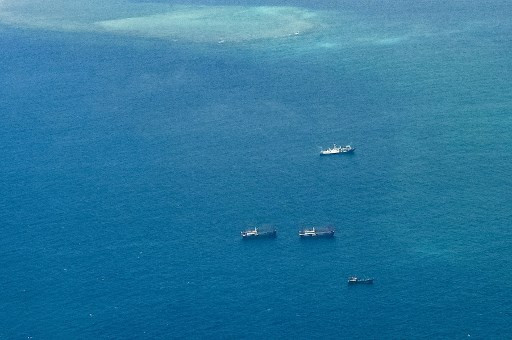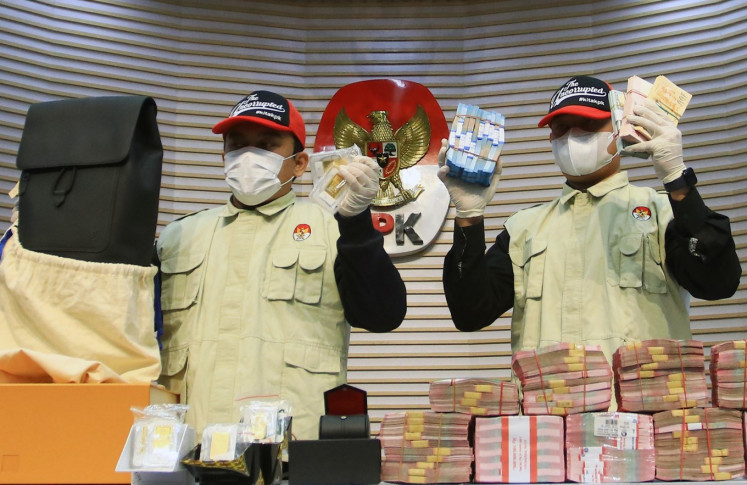Popular Reads
Top Results
Can't find what you're looking for?
View all search resultsPopular Reads
Top Results
Can't find what you're looking for?
View all search resultsOur role in the South China Sea
Indonesia has a strategic role as a broker of peace at the ASEAN-China negotiating table over the disputed waters.
Change text size
Gift Premium Articles
to Anyone
L
ast week’s incident in the South China Sea between Chinese and United States warships proves the need for all parties to not only exercise restraint but also play active roles as peacemakers. And Indonesia is a good example of this.
Al-Jazeera quoted Chinese state media as describing the US ships as having trespassed “Chinese territorial waters”. The US responded by saying that its military “will continue to fly, sail and operate wherever international law allows”.
Earlier, the US military accused a Chinese fighter pilot of engaging in a separate risky maneuver over the waterway: flying within 20 feet of the nose of a US Air Force plane.
China had long claimed almost the entire South China Sea as its own, but in July 2016, the Permanent Court of Arbitration in The Hague ruled its claims were baseless.
Indonesia and China are embroiled in a longstanding dispute over the North Natuna Sea, with China saying the marine area has been its traditional fishing ground for thousands of years. Beijing is also protesting Indonesia’s gas exploration in the waters, which is valid under the 1982 United Nations Convention on the Law of the Sea (UNCLOS).
But Indonesia maintains and can still play the role of an honest peace broker for several reasons.
First, earlier this month in its capacity this year as the ASEAN chair, Indonesia broke the years-long stalemate over the South China Sea Code of Conduct (CoC) between the regional bloc and China. Although not legally binding, the CoC is still essential as a fundamental guideline for preventing and mitigating the risk of open clashes between disputing parties, as Brunei, Malaysia, the Philippines and Vietnam have also claimed parts of the South China Sea.
A meeting on the CoC between senior officials was recently held behind closed doors in Jakarta. There were strong indications afterward that any meaningful progress remained elusive, dependent as it was on China’s critical role in the negotiations rather than ASEAN’s.
Still, several agreements were reached during the meeting, according to Chinese Foreign Ministry spokesman Wang Wenbin. The Jakarta Post quoted an Indonesian Foreign Ministry official acknowledging that “they were still unable to give a clear timeline on when the CoC would be concluded and that disagreements were still rife in the latest talks”.
Hopefully, as the negotiations continue, both parties will be eager to demonstrate a strong willingness to finalize the much-awaited CoC in a timely manner.
Second, Indonesia and Vietnam have proved there is always a peaceful way to solve any conflict, no matter how complicated.
In December, following a bilateral summit in Jakarta between President Joko “Jokowi” Widodo and then-Vietnam president Nguyen Xuan Phuc, the two governments signed a historic agreement to demarcate their exclusive economic zones (EEZs), marking an end to 12-year talks held in line with UNCLOS.
In 2003, the two ASEAN neighbors had previously agreed on their continental shelf boundaries, after decades of bilateral negotiations as fishers from both countries frequently clashed in the contested waters.
The two countries have set a good example. When disputing parties do not possess strong political will to reach a mutual solution, compromise is never possible. So when ASEAN and China have a good intention to achieve peace, compromise is always possible.
We must also keep in mind that territorial disputes are not limited to the South China Sea, or in the case of Indonesia, the North Natuna Sea. Take a look at the Malacca Strait. Following massive international protests, Indonesia launched a massive anti-piracy operation there and local maritime security has greatly improved now.
Indonesia, Malaysia and Singapore are littoral states on one of the world’s busiest sea-lanes. The Malacca Strait directly connects the South China Sea. Every year, approximately 90,000 ships pass through the strait, reportedly carrying 40 percent of global trade.
Although it has a recurring dispute with China in the North Natuna Sea, as ASEAN’s largest member, Indonesia has demonstrated its commitment to peace and filling the role of peace broker in the South China Sea.











